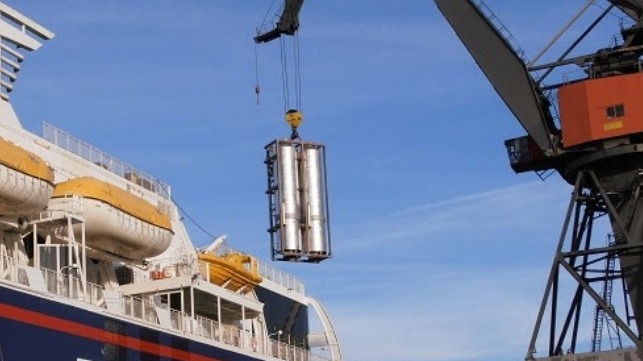 Scrubber retrofit in progress (file image)
Scrubber retrofit in progress (file image)
_x000D_
By MarEx 2019-05-08 14:04:56
_x000D_
_x000D_
The Clean Shipping Alliance 2020 (CSA 2020), the industry association for scrubber manufacturers and users, has been conducting a successful campaign to convince port authorities not to ban the use of open-loop scrubbers within their waters.
_x000D_
_x000D_
After a series of meetings with port officials, CSA 2020 has secured written no-objection letters from 20 seaports in Europe, the Americas, Asia and Australia. Moreover, the ports approached indicated that they do not intend to submit any papers to IMO about scrubber operation unless new, compelling research comes to light.
_x000D_
_x000D_
“After research carried out by the Ministry of Land, Infrastructure, Transport and Tourism (MLIT), Japan has now stated it will not ban the use of open-loop scrubbers in its waters and we hope to have more written confirmations in place soon,” said CSA 2020 Executive Committee member Christopher Fee, General Manager, Environment and Sustainability, Oldendorff Carriers. “It appears that some ports are revoking their earlier decisions to restrict open-loop scrubber use now that more academic studies have been made publicly available.”
_x000D_
_x000D_
Scrubbers are designed to remove sulfur oxides (SOx) from the ship’s exhaust stream, thereby bringing the vessel into compliance with IMO 2020 low sulfur requirements without switching to the more costly 0.5 percent low sulfur fuel oil (LSFO). As a beneficial side effect, scrubbers also remove several health-hazardous air pollutants not covered by the IMO 2020 requirements, including up to 94 percent of the exhaust particulate matter (PM), up to 60 percent of the black carbon (BC) and a significant amount of the polycyclic aromatic hydrocarbons (PAH). All of these pollutants are absorbed by the scrubber’s wash water, which is either cleaned and reused on board (closed-loop scrubber operation, a less-utilized option) or treated and discharged to the sea (open-loop scrubber operation, the primary method). Some scrubber designs are capable of both open- and closed-loop operation, depending upon the operator’s needs.
_x000D_
_x000D_
In February, DNV GL verified a three-year study based on 281 wash water samples from 53 different EGCS-equipped vessels, concluding that the samples were well within the allowable IMO criteria, as well as within the limits of other major water standards. A study carried out by Japan’s MLIT has also concluded that no short-term or long-term effects on marine organisms can be caused by the use the technology.
_x000D_
_x000D_
Several seaports and governments – notably Singapore, Fujairah, California, Belgium and China – have banned or limited scrubber operation within certain territorial waters. Even if unused in port areas, scrubbers are still a cost-saving option for most operators, since the majority of the ship’s fuel consumption occurs during transit – but local scrubber bans introduce additional complexity, like segregating low- and high-sulfur fuels and dealing with the technical hurdles introduced by fuel switching when entering regulated areas.
_x000D_
_x000D_
CSA points to scrubbers’ real environmental benefits for port residents. Air pollution has been found to cause low lung function and is often associated with other health problems, including cancer, cardiovascular and dermatological diseases. “The industry must not lose sight of the reason behind the introduction of the global sulphur cap and the effect sulphur oxide emissions has on human health. Marine exhaust gas cleaning systems are the best way of reducing shipping’s environmental impact by preventing air pollution whether a ship is at sea or in port,” said CSA 2020 Chairman Mike Kaczmarek, Vice-President of Carnival Corporation.
_x000D_
source: www.maritime-executive.com


